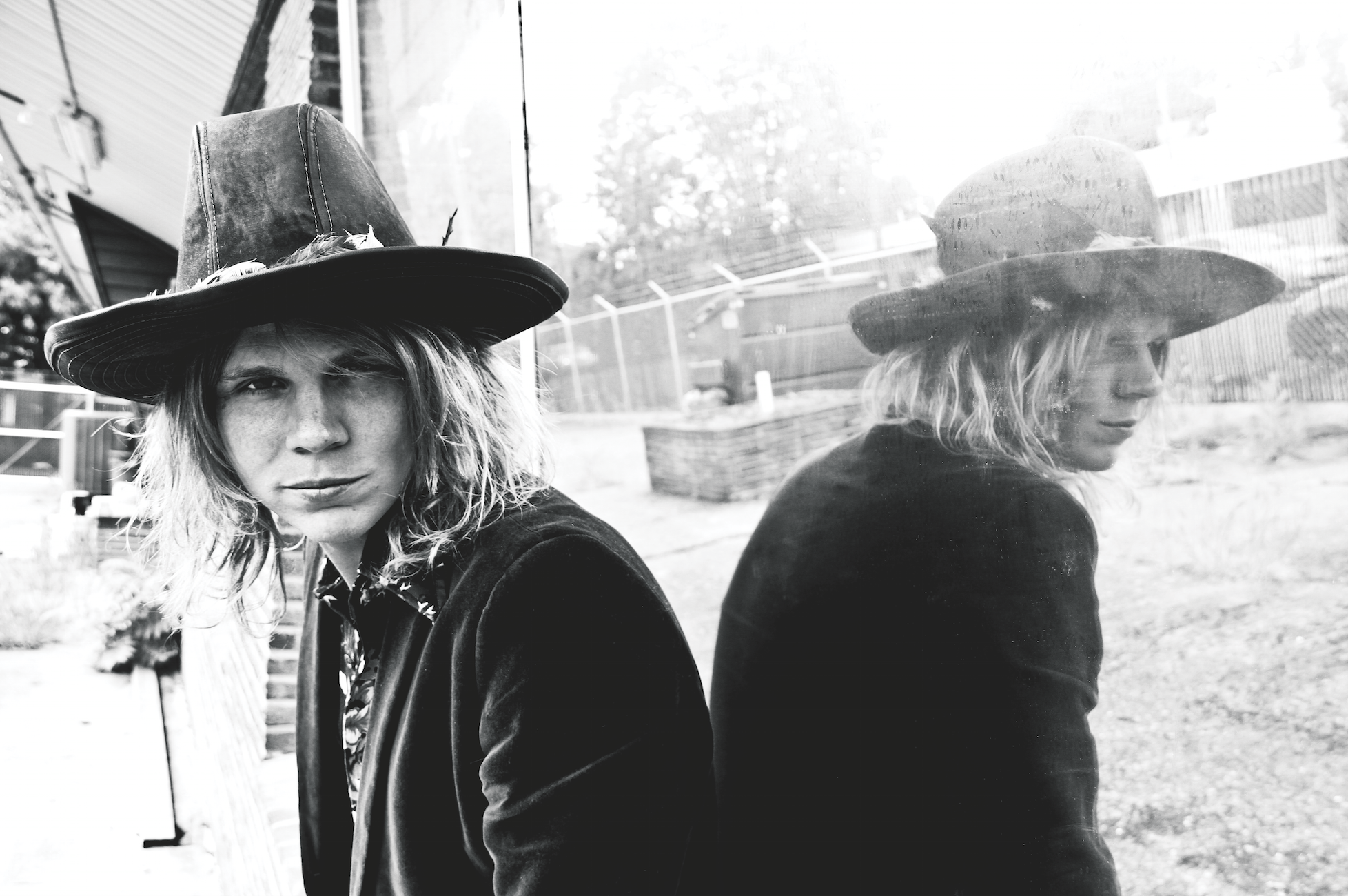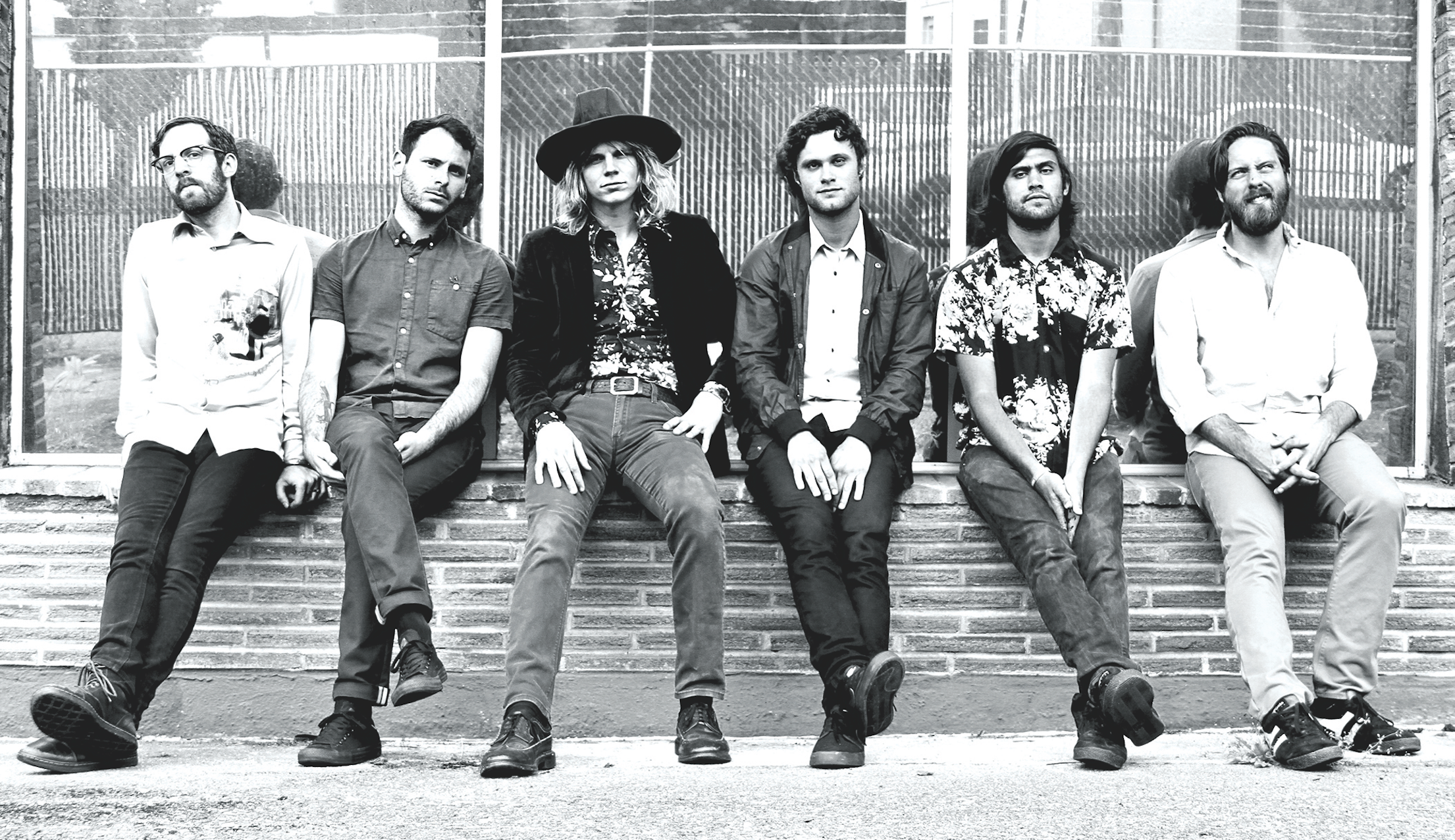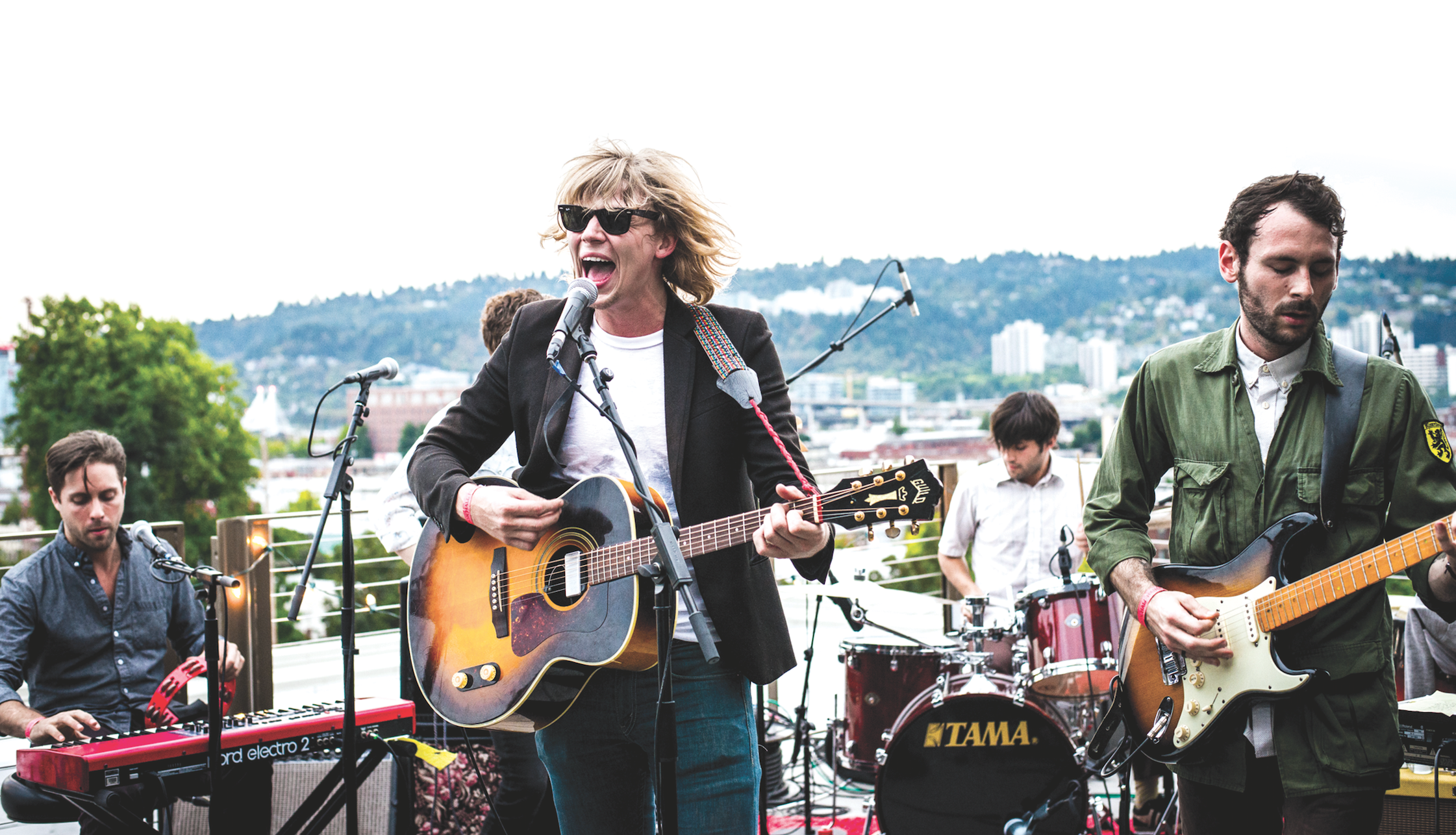Kyle Craft


From the opening lines of “Eye of a Hurricane” to the closing goodbye of “Three Candles,” Kyle Craft confronts the problem of what magic word will bring ’round the girl of his dreams. He’s found no solution. It would seem his Muse is a jealous lady, and lonely nights the price for inspiration. But his fidelity hasn’t gone unnoticed, and after enduring a famine of the heart, his Lady cast him two divine trifles: a much needed nail in the coffin of his former life, and his new album, Dolls of Highland, out earlier this year on Sub Pop Records. At the time of this rebirth, he had been working and reworking these songs in a Portland basement; a handful of demos had surfaced, but he would need to revisit his old haunts in Louisiana once more for the final cuts. Now he’s turned on his dusty, booted heel and set off high-shouldered into the blue Northwest, his past pawned and the cash in hand.
On the album, a breathless caper of jangling guitars and shiny keys, Kyle Craft leaps in the sun and courts beneath the moonlight, swinging hard with his heart and voice. Fat-free, the songs burn inward to the bone where they smolder and stick. His orchestration, though consistently rock ‘n’ roll throughout the record, shifts emotionally with the lyrics, clarifying and strengthening them. When the stripper “Berlin” swings herself around the pole slow, the drums throb, and the piano’s all sleaze; the mental demons of “Pentecost” swoop in amid the shriek of a pained guitar line; the begging, trembling voice at that song’s end is mirrored in the lyrics “We could go downtown/take the one in the chamber out.” The result is a union of sound and image that reminds us why the human voice, with its unique ability to sing and tell, is the most enduring instrument.
Lyrically, Dolls of Highland is at once love letter, bitter grudge and apology to the women longed for and lost, the boys who took his place, and everyone caught up in his undertow of rejection and rebirth. But it is no self-absorbed pity party. With the slanted eye of a poet and a storyteller’s turn of phrase, Craft transforms the traces of these people into a surprising, wild portrait of humanity with all its restless and contradictory obsessions. Images flash and turn like tarot cards: prom- dressed strippers, six-headed hounds, day-lit ghosts, furious girls chasing away the Grim Reaper, Black Mary, the jester, the poet, a warm shot of rye, spinning coins, and candlelit goodbyes. And in the eye of this hurricane is Craft, giving it all his wry point of view. Ever a victim of twisted timing, he bears bad fortune with a shrug on the outside but a scream in his soul, and never begrudges his subjects their crazes and cravings. After all, what’s a poet without a cracked rib or two? We see him high up an apple tree, stretched out on a rotting limb and reaching for fruit he should know better to avoid. He gets burned. He’s a fool in love anyhow. But unlike many lyricists these days he doesn’t bury his vulnerability beneath hip irony or obscure it with selfish mumbling. Instead, he wades into the muddy water along with us, hands outstretched and messy, unwilling to judge others before he first sees his own reflection. You can see Craft on June 18 at Alberta Abbey for Eleven‘s five-year anniversary celebration.

ELEVEN: Why did you choose Portland?
Kyle Craft: Because of everyone I knew here, all the Animal Eyes guys, and my bassist, Nick. Basically what happened after my relationship ended down in Shreveport and my old band broke up was I had the hots for this chick that was living in Ireland, and I was like, “Well what I’m gonna do is go to Portland, record this album in my buddy’s basement, and then go back to New Orleans when she comes back from Ireland and try to sort of, like, fall in love…” And this is, in retrospect, such a stupid whimsical idea because it was absolutely motivated by infatuation and not by anything that was slightly real. It was all in my head. And she did nothing wrong.
Basically, long story short, I went down and visited her, and at the end of a three-week period we went out, had some drinks and stuff, were never romantic in any physical way, but went out to this bar and had a great night, really fun, got back to her place and it was like this thing where, it was my last time being there, and she was the only force in heaven and earth that, had she said, “Yeah, I’ll give it a shot,” then this album wouldn’t have happened. Had she said, “Yeah let’s try it out,” I would’ve been like, “OK, sweet. I’m staying in New Orleans,” but instead she was like, “Well, I have a boyfriend back in Ireland.” And I didn’t know that the whole three weeks I was hanging out with her. And there was this moment where I was absolutely, pretty wasted, four in the morning, we were just sitting on her stoop off of Frenchman, and she said that and I said, “Well what am I doing here?” and I think that might’ve been the last thing I said to her, and I got in my van and drove to Portland. That was September 2013, I guess.
11: Interesting segue into a new life, new city.
KC: Oh yeah. I changed. There was this giant leap. I don’t like to harp so much about the whole “rebirth” thing I had…
11: Talk about it.
KC: I think I had some anxiety, pretty constant, pretty heavy stress. All the time.
11: Coming from what?
KC: Everything. Whether it was my old relationship, or the band I was in. Just a lot of things. I just didn’t feel good for a really long time. And there was this moment where, when I was finally in Portland, I was like, “I’m gonna give this whole New Orleans girl thing one more shot.”
11: What? After you came to Portland?
KC: It was a very simple thing. This was “pre-rebirth.” Still slightly trying to figure out “what the fuck,” I invited her to New Years, and was like, “Hey, you know if you ever told me to give up, I would leave you alone and give up. But I would really love to hang out with you more.” And she was just like, “It’s probably best if you give up.” And that moment, the me you see now, like in front of you, is this person that existed sort of in the back of my head for years being like, “Hey man, hey, you’re kind of like fucking up. Why are you so fucking stressed? What’s wrong? Why don’t you just not care about anything?” And at that moment, whenever it was finally “give up,” this person kind of like reached out of the back of my psyche in a weird way and instead of just joining forces, the other person pulled the old me in, kicked “old” me out the door, and I just changed immediately. I guess it’s very much one of those situations where you find yourself on this sort of rock bottom playing field where it’s the crash and burn situation of the old you, and you get there and then when you start working your way back up you’re this whole other animal.
11: There’s a huge element of love lost, and impossible, foolhardy infatuation in your lyrics. You feel that’s coming from personal experience?
KC: Absolutely. They are 100 percent things that existed. It’s not like I make any of these things up. Some of it there is an ambiguity to. I mean if I said some things straight up, it’d be this thing like, “Oh god, well that really is a fucked up situation,” but it’s all there. For me, this whole writing experience, being a musician, is like writing a memoir constantly.
11: There’s a sense of victimization in your songs sometimes, victim of heartbreak, a cruel world. How do you see yourself in the songs?
KC: I mean there were certainly times when I wish things would’ve been different. Everybody’s victim to something. I would never want to make it seem, and I don’t think I do, like I’m victimized by people though.
11: What are you victimized by though?
KC: Circumstance. Timing. A huge part of that transition was realizing that you’re not in control. I don’t ever blame anyone for anything.
11: You told me once how sometimes there are these performers who make you want to roar, make you tear something apart. It’s a dark side to creativity. How do you find that in your music?
KC: There’s different ways to do that. There’s an element of capturing a moment lyrically. There’s only so much you can say about gun control in a song, and it’s never going to do anything by saying that. And I don’t think that was ever the point of art to begin with. I think the point of art was to let other people know they are not alone in the world, in general. What Dylan does in some songs, is he paints this picture that you look at, like in “Visions of Johanna.” You see yourself in these songs, but you also see the world in these songs. And they’re not trying to say anything; they’re not trying to change your mind. Lyrically, that’s what I strive for. Then there’s the other part, the immediate performance part, and there’s a rawness to that which needs to keep going and be there forever, because, I don’t know, it’s watching somebody bleed out on the floor. It’s watching a car wreck. It’s like watching some sort of macho man getting held down by multiple other people and just get the fuck beat out of him. That’s the vulnerable part. I think that art needs to be vulnerable, because that vulnerability, that’s what people need to know they’re not alone. If everybody walked around with some sort of mask on, this whole macho thing, or this pretentious, overly hip thing like, “Oh you haven’t heard of this…?” Well, none of that ever does anything for anybody. It doesn’t make people feel good. It makes people feel isolated. I just don’t agree with that. I feel art should be vulnerable. Then there’s also the fun part.
11: Many of your songs are vulnerable, with a longing quality to them. Others, like “Berlin” and “Gloom Girl” are more joyful and celebratory. Both are just these wonderful explorations of the hilariousness of life and relationships. How does the fun part interact with the vulnerable part?
KC: Yeah I mean that part, the rock ‘n’ roll part is always fun. That’s what “Berlin” is. Straight up, that’s all that is. There’s no grand message in “Berlin.”
11: Tell the story of “Berlin” if you can.
KC: It’s pretty simple. Whenever I got to Portland I was always looking for things to do, and the whole Stripparaoke thing was going on down at Devil’s Point. We’d always go down there, and this girl, I was like, “Oh, she’s really cute.” She sort of reminded me of something straight out of Rocky Horror Picture Show. I just found this immediate attraction to her. Didn’t even know her, never talked to her. Just went home and wrote this song. And absolutely based off a few nights at a strip club, not even knowing this person.

11: Before Sub Pop contacted you about getting signed, what were your ambitions?
KC: I never really had any. I was pretty whimsical. Even now, after everything, after this whole rebirth thing for me, it is this thing where I still live day to day. As far as the album goes, that was just me doing the only thing I knew how to do. And I feel like part of it was almost this other thing, like this weird ghost steps into you and says, “Alright.” It guides in a way.
11: What does that ghost feel like?
KC: The perfect drug. It comes and goes. Inspiration. And I don’t think you can have it forever, but when it does come, the more you acknowledge it being there, the more it acknowledges you being there. And you kinda succumb to it in a way. That’s how the album was. These songs, it was just a roll of film. And it was like this roll of film that you take out of the camera and you put on your shelf for a minute and you know there are good pictures on there, and then you get it developed and you’re like, “Fuck yeah those are the pictures, that’s exactly the shot I remember taking.”
11: What qualities do you look for in great music and art?
KC: I think the main thing is to maintain the human element. Let the world know that you’re this open person. I don’t have any fucking secrets. They’re all in the songs. It’s all there. People want to watch this, like I was saying earlier, this fight, or this car wreck. If you’re standing on the corner and a car wreck happens, are you gonna turn your head and walk away? No. You’re gonna watch it. And if you don’t watch it you’re at least gonna think about it for awhile. You know what I mean? To me that’s how songs are. Especially executing the songs. I’ve said before that when I see this thing on stage, when I watch this performance on stage, I want to see it bleed in a way. I want to see it really fucking sort of falling apart in a way, not absolutely, but whether it be lyrically or the force behind the performer, there’s this element of blood that I want to see, like I want to know that that person’s a human and not a fucking robot.
11: When someone’s performing in a really honest way, how do you know it’s sincere?
KC: For some reason you can just tell. You can’t ignore the idea that there’s always some character on the outside of an artist that might be distorted in his or her own view, like their own view of themselves. I guess my main thing is trying to get to that sort of nirvana state of being an artist. Being able to walk through a bar and if something happens, I can put it into a word. It’s very much a camera thing, like I was saying earlier. You take the snapshot. You don’t get the film developed for a while but you remember taking that picture. Maybe when the film comes out the picture is not exactly how you remembered it, but you were there and you certainly took the picture. And that’s, as far as lyricism goes, the only thing I imagine that’s worth anything, is documenting this human experience of wherever you are, really. Whether it be a heartbreak thing, or your friend killing himself. It’s always worth documenting. »



